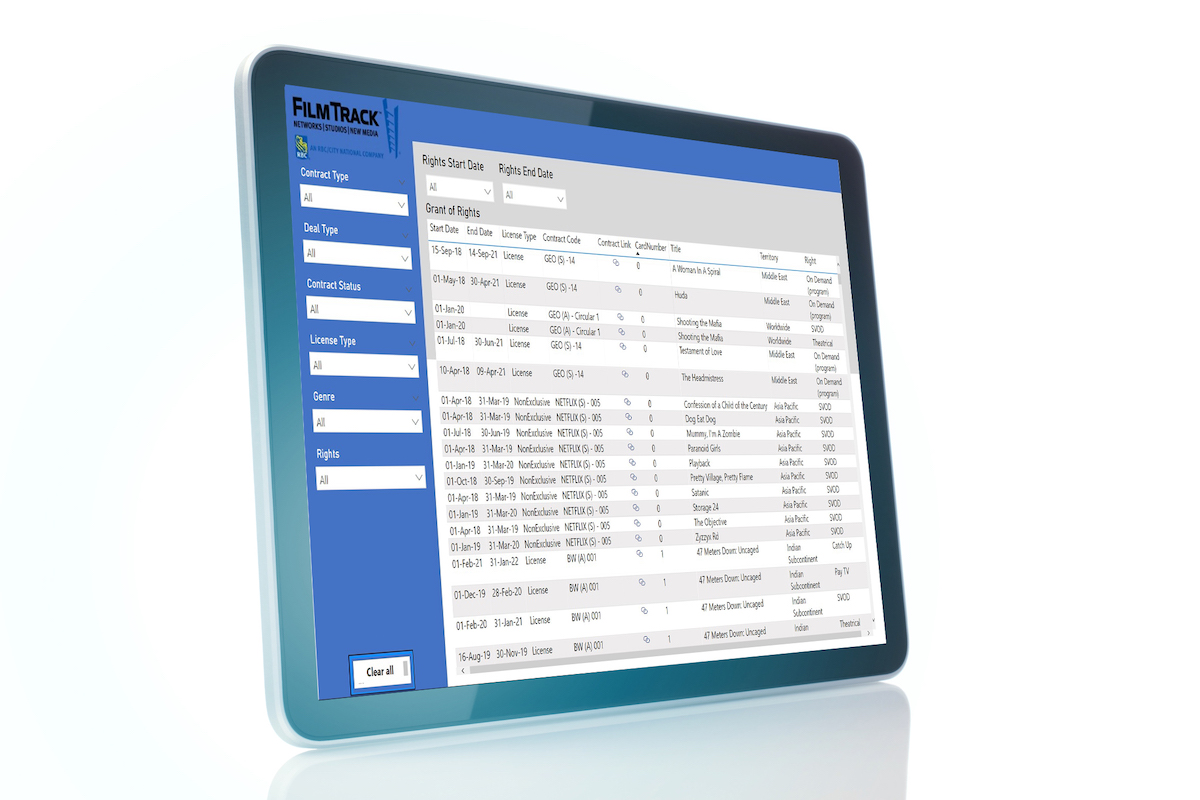Data and the right technology to manage data meaningfully are crucial in film finance and licensing. They provide valuable insights and tools to help media companies and investors make informed decisions. They also play a vital role in digital film distribution through data analysis that reveals trends in things like consumer behavior, buying preferences, territory habits, availabilities, and more. Here's a look at some things data influences in our industry and what technology media companies use to stay on top of it all.
What Does Data Influence?
Digital Distribution
With the rise of streaming services and digital platforms, data and technology play an essential role in the licensing and distribution of films. Rights agencies can use analytics tools to track viewership data, analyze trends, and optimize distribution strategies. Data can help you leverage the right audience on the right theatrical or digital platform at the right time. Data on your content and distribution partners can also inform decisions on who to align with and where lucrative opportunities may be for selling or buying titles.
Market Research
Data and technology can provide media companies, studios, and financiers with business intelligence into the preferences and behaviors of audiences, which informs decisions about what films to make, how to market them, and where to distribute them.
Licensing Rights
Licensing rights have become an absolute labyrinth these days for distributors. Two key areas where data helps are:
-
Licensing Timelines
Every film has its own licensing timeline, and those managing film production, financing, and production understand it can take a long time to make money off a given project. When licensing rights run out, better record-keeping and data help you decide whether it makes sense to relicense a film, how to alter a contract (if that is the better option), or sell off the asset.
-
Contract Terms
As contracts become more complex, sometimes the question of who owns what and the usage rights may be unclear until a judge or arbitrator gets involved. When licensing rights become murky and things are moving fast, you need a reliable way to settle the score. A platform that can handle all the contract data inputs helps do this.
What Technology Helps You Manage The Data?
Blockchain Technology
Blockchain technology is still evolving, but is being looked to as a way to possibly streamline film financing processes by providing a secure and transparent way to track ownership and revenue-sharing agreements among stakeholders. It is also becoming increasingly relevant in distribution and piracy prevention.
Some ways this is being investigated are:
-
Distribution: Blockchain technology can possibly be used to create a secure and decentralized distribution network for films, allowing for direct peer-to-peer transactions between content creators and consumers. This would reduce distribution costs, eliminate intermediaries, and provide greater control over distributed content.
-
Financing: Blockchain may be useful in creating smart contracts, which are self-executing contracts with the terms of the agreement between buyer and seller written into lines of code. This can be particularly useful in film financing, as it can automate the process of revenue sharing among investors, distributors, and creators. Additionally, blockchain can provide transparency and security in investment transactions, reducing the risk of fraud and improving accountability.
-
Piracy prevention: With annual global revenue losses estimated between $40-$97.1B, we are all looking to reduce ways material can be stolen.
The immutable and transparent nature of blockchain can possibly be used to prevent piracy by creating a permanent and traceable record of ownership and distribution rights. This can help prevent unauthorized distribution and ensure that creators and investors receive the revenue they are entitled to.
Rights Management Technology
While blockchain capabilities in our industry are still being hashed out, some smaller media agencies are still relying on spreadsheets to track data—although few would deny it puts them in a precarious position. Missing or incorrect data can lead to untraceable and unforeseen ripple effects, particularly as your library of assets grows.
When you're using quality rights management software designed for the film industry, automation tools help record and itemize costs and reveal opportunities to monetize on titles. Data can show agencies the bigger picture behind decisions. Stronger financial statements can be the key to selling future films or strengthening your position during negotiations.
Streamlined software helps you better understand which factors drive your distribution sales. They can spot trends in your titles and the industry that others miss, leading to better investments, budgeting, forecasting, and more efficient sales.
How FilmTrack's Tech Helps You Manage Your Data
If you need to process complex financials and want to house all licensing rights and royalties under one platform, check out FilmTrack's custom-built solution for rights management that makes your data easy to understand and configure. We help you track, safeguard, and use your data by:
- Presenting automated, real-time contract and availabilities data across your entire catalogs
- Providing analysis tools that let you pivot critical data by any characteristic or virtue (territory, licensees, medium, etc.)
- Helping you spot timely trends in sales, collections, and other KPIs
- Enabling data collation with information from other enterprise solutions (ERP, scheduling, etc.)
- And so much more!
Let us show you how you can control your data with cutting-edge technology. Schedule a demo to learn more!



